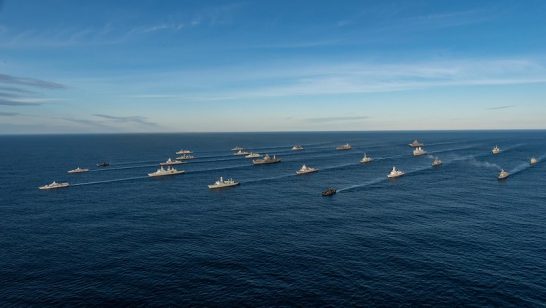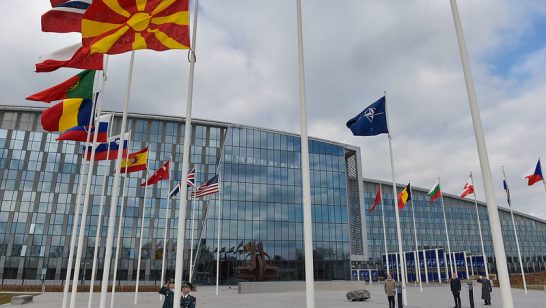
Following Navalny’s sentencing last month, it seems nearly impossible for the EU to gain anything positive from relations with Russia. How should one deal with a country whose increasingly autocratic regime is imprisoning its opponents, making a mockery of the rule of law, and eliminating any opposition? How to deal with a country – the duping of the EU foreign representative Borrell during his recent visit to Moscow made this clear again – which apparently considers the European states not to be on equal terms and an “unreliable partner”?
But just complaining is of no use. Outrage and moral indignation are not categories in international politics. A regime that sees itself marginalised and cornered will care less and less about international opinion and rules. It becomes less and less impressionable when it gets the sense that it has nothing to lose. Putin’s Russia will not shy away from provocations in the future if it is confronted by a Europe that produces inconsequential declarations, a policy of containment, and it sees no prospect for effective engagement.
Europe needs a credible common policy towards Russia that is not naive or appeasing, but rather interest-driven, consistent, sober and pragmatic, foregoing cheap and empty moral pathos.
Stereotyped condemnations and a passive wait and see attitude will not lead anywhere. What is needed now is a calibrated approach. Past experience has shown that comprehensive sanctions because of Putin’s actions against Navalny, and his supporters will not have the desired success. However, targeted individual sanctions against Putin’s corrupt and kleptocratic cronies can send an unmistakable signal. We owe this not least to the vast majority of the Russian population and the impressively courageous protesters in many cities in Russia.
But it must not end there. Precisely because of the fundamental differences and the dangers of isolating Russia, it is also necessary to sound out opportunities for dialogue, cooperation and detente. However, such a realpolitik approach can only be viable and credible on the basis of an unambiguous commitment to Western values, a clear pledge to the EU and NATO, and increased national efforts to ensure secure defence capabilities.
It is time to take a high-level political initiative for a new approach to cooperation with Russia. To this end, it is worth recalling the successful Western policy in the 1970s and 1980s, which – in full awareness of the seemingly insurmountable contradictions that existed at the time – used opportunities to press for dialogue and cooperation with the Soviet Union and the Warsaw Pact states. This courageous policy contributed to overcoming the confrontation between East and West and safeguarded against the considerable risks related to it. In contrast, the policy of confrontation and containment of Russia pursued over the past 20 years has not proven to be effective. The arrogance and disregard for Russia that has been common since Bush Jr. and the dismissal of Russian interests have downright provoked Putin to adopt an aggressive foreign policy geared towards recognition as a great power.
European security and stability must be at the centre of such an initiative. It is important not to let the spiral of confrontation between the West and Russia get out of hand. To this end, the initiative could primarily pursue two objectives:
First, the creation of a new collective security architecture. What is needed is a departure from the policy of ostracism towards Russia. The OSCE, the CSCE process, and their central documents (Helsinki Final Act 1975, Paris Charter 1990) can serve as key points of reference in this regard. However, a revival of the OSCE does not seem very promising because of the marginalisation it has suffered over a number of years now. Reflecting today’s realities, a new political conference could reaffirm common values and principles, give a new impetus for practical cooperation, and work out collective solutions to existing conflict situations. As in the CSCE, it is in essence about a balanced substantive approach, which would also be of interest to Russia, for example by strengthening cooperation in business, science, technology and the environment. However, to be meaningful, this approach, which aims to provide inclusiveness, must not be confined to non-binding or noncommittal declarations.
Secondly, a new approach to European arms control. It is to be welcomed that Presidents Biden and Putin agreed to an extension of the New START Treaty. However, the agreements that directly affect European security have largely been abandoned. A return to the INF Treaty and the de facto-terminated Treaty on Conventional Armed Forces in Europe is hardly realistic; it will most probably prove impossible to keep alive the Open Skies Treaty following the US withdrawal, which took effect last year, and since Russia has now also announced its intention to leave the Treaty. A fresh start is now particularly urgent, and it should focus specifically on existing security risks. It could, inter alia, be geared towards the negotiation of a stability and transparency regime in relation to the border between the Baltic states and Russia, targeted stabilizing agreements pertaining to existing crisis and conflict situations in the Caucasus and between Russia and Ukraine. In addition, overall measures to promote military dialogue and confidence-building are needed to prepare the ground for more ambitious arms control accords.
Finally, a remark on Nord Stream 2: One may rightly consider it a grave foreign policy mistake that the project was pushed through without proper consultation. This has led to a regrettable split within the European Union. However, now – after almost 95% of the pipeline has been completed – it would be a mistake simply to abandon the project. The argument that Germany will enter into a one-sided dependence on Russian energy supplies with Nord Stream 2 does not stand up. In addition, after completion, Germany will still have the option of restricting or preventing Russian gas deliveries as part of the sanctions.
It is high time to recall the successful policies that led to overcoming the Cold War and to realise the flaws in the policy towards Russia over the last two decades. Condescension, contempt and ostracism have proven to be unsuccessful. We need a return to hard-nosed, interest-driven realpolitik as provided for in the double-track strategy of the 1967 Harmel Report of the Western Alliance.
The opinions articulated above represent the views of the author(s), and do not necessarily reflect the position of the European Leadership Network or any of its members. The ELN’s aim is to encourage debates that will help develop Europe’s capacity to address the pressing foreign, defence, and security policy challenges of our time.
Image: Wikimedia commons



